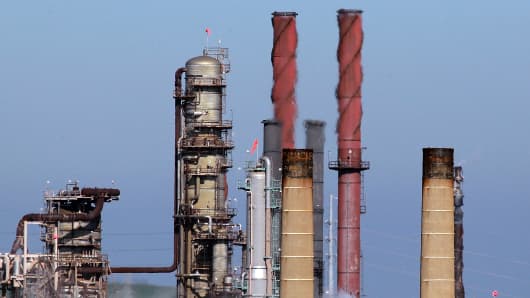Brent oil gained on Tuesday, bucking a five-day losing streak, boosted by North Sea supply disruptions, optimism on Chinese oil demand, and a rise in U.S. equities.
Gains were limited, however, by medium-term concerns such as rising supply and the ongoing fiscal crisis in the United States.
Brent crude futures were last up 1.6 percent at nearly $112 per barrel, after touching $111.09 in earlier trade.
U.S. light, sweet crude rose 70 cents a barrel on Tuesday to settle at $90.82 per barrel, tracking a rise in U.S. equities and indications that China could act to stimulate crude demand in the country.
The Dow Jones Industrial Average soared to a record on Tuesday and China announced it will target 7.5 percent GDP growth this year by focusing on boosting consumer demand.
U.S. crude rose for the first time in four market sessions.
A North Sea pipeline closure has helped halt a downtrend that saw Brent sink in the previous session to $109.58, the lowest level since Jan. 17.
"I view the gains so far this morning as more short-covering off the pipeline news rather than any surge of new buying interest coming into the market," said Dominick Chirichella of the Energy Management Institute in New York.
The 80,000 barrel per day (bpd) Brent system was shut for the second time in seven weeks after oil and associated gas was found to have leaked into a leg of the 10,000 bpd Cormorant Alpha platform - offline since January.
In Nigeria, Royal Dutch Shell declared force majeure on its Bonny Light crude deliveries following a leak on a pipeline that was discovered on Sunday. It was not immediately clear how long it would take to repair the line.
Commodity investors were cheered by China's vow on Tuesday to deliver economic growth at 7.5 percent and concentrate on boosting domestic consumption.
(Read More: China's Monetary Policy Baffles Investors)
The statement from outgoing Premier Wen Jiabao countered concerns about demand in the world's No. 2 oil market. Purchasing manager surveys over the weekend had suggested growth in China's key manufacturing and service sectors may be slowing.
In the United States, equities investors betting on a quickening U.S. economic recovery helped to send the Dow Jones Industrial Average to a record high on Tuesday, breaking through levels last seen in 2007. The Dow has gained more than 8 percent so far this year.
So far, investors have shrugged off most concerns about $85 billion of automatic U.S. government spending cuts that came into effect on Friday. But the International Monetary Fund estimates that the cuts, if fully implemented, will shave 0.5 percentage points from the U.S. growth rate.
Markets are now awaiting U.S. nonfarm payrolls data due this week for further clues on the health of the U.S. economy and the future of the Federal Reserve's monetary easing program, analysts said.
U.S. crude inventories likely climbed last week for a seventh straight week, according to a Reuters survey ahead of the release of weekly inventory data from the American Petroleum Institute later in the day.


